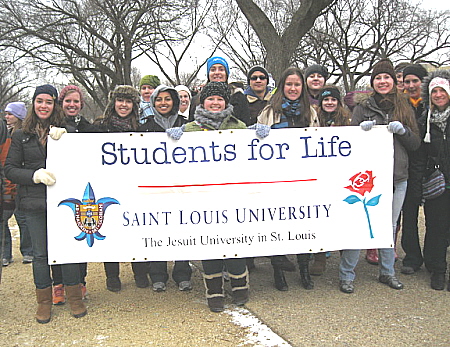|
This article appeared in Human Life Review, Fall 2015. Copyright © 2015 by Mary Meehan. (In this presentation, the fourth paragraph and first endnote have been rewritten to correct an error about the origins of a website.) College Students Step Up to Help Student Mothers  Toddler in a snow at the MiraVia residence, next door to Serrin Foster believes that today's prolife college and university students "can transform this world, one campus at a time." She says they want "to do something good--and not just something good, but something great." Foster, who is president of Feminists for Life of America, is delighted that so many students are actively supporting aid to pregnant students on campus. She and her colleagues have worked for many years in this area. Progress was slow at first, but support now seems to grow by leaps and bounds. Campus prolife groups are stressing it more than ever before. While the work focuses mainly on single moms, some of it also helps married students with children. This is especially the case on large state-university campuses, where married graduate students traditionally have struggled to make ends meet. Students for Life of America has become heavily involved in this work in recent years. Its campus groups often invite Feminists for Life to present a Pregnancy Resource Forum. Moderated by Foster or another FFL leader, this features campus administrators who explain what the current resources are. Students attending the forum have a chance to ask lots of questions and suggest more features they believe are needed. This can be anything from diaper decks in campus restrooms, to on-campus housing for student parents, to a childcare center on campus.  Serrin Foster Feminists for Life also created a pregnancy resource survey, guide, directory of resources, and a map of schools. They shared the survey results and other information with Students for Life. This inspired an expansion of SFL's already-existing "Pregnant On Campus" website. "They've improved upon the map and directory of resources," Foster remarked.(1) Beth Rahal of Students for Life now maintains the site, which can be found at: pregnantoncampus.org. How does she manage the mammoth job of updating the information? "A little sleep and a lot of help from other people," she said. While she does a great deal of research on her own, she also asks campus prolife groups to keep her posted on campus and community resources. Rahal heads the SFL Pregnant on Campus Initiative. Besides showing SFL campus groups how they can help, she answers queries from pregnant students who contact her directly. She compiles a list of resources for each one, and she tries to ensure that students "pursue what resources they think best fit their needs." Sometimes, they already are headed in the right direction and mainly need to hear that "you're asking the right questions" and "you've taken the right steps so far." Sometimes they need a little more guidance: "Here are the questions that you need to ask" or "Here's what you're gonna do when you have that phone call." Rahal and other Students for Life staff also work with and encourage SFL campus groups who are running their own programs to help student parents. She said there has been "a great surge of enthusiasm" from students about pregnancy/parenting resources.(2) The "Pregnant on Campus" website includes her monthly blog of practical advice for parenting students and campus prolife groups. She writes many of the blogs herself, but also features some by other writers. One student mother offered excellent "Practical Advice for Student Moms," including tips on how to avoid sky-high textbook prices.(3) In one of her own posts, Rahal highlighted actor Ashton Kutcher's campaign for diaper decks in men's restrooms. "As a new dad," Kutcher said, "I recently learned an unfortunate reality about changing diapers while out in public with a child. Almost all public changing tables are in women's bathrooms, which makes it nearly impossible to find a table that's accessible to dads." He called on Costco and Target stores to give good example by providing changing tables in their men's rooms.(4)If done widely by stores and other public places, this would make it easier for fathers to be involved in their small children's lives. Anyone who in their childhood experienced special times with their dad knows how important this can be.  Beth Rahal In another post, Rahal described how the campus prolife group at the College of the Holy Cross, Worcester, Mass., arranged a baby shower for Samantha, an expectant mom on campus. Besides providing practical gifts that ease financial strain, a shower provides great psychological support. One student, who helped with Samantha's shower at "the busiest time of the semester," remarked that: "Seeing Sam's face and how happy she was surrounded by friends and family made it all worth it."(5) Feminists for Life has started a new website of practical information for all parents. It's called "Raising Kids on a Shoestring" (kidsonashoestring.com). It includes tips on everything from buying clothes ("First Stop: Thrift Store"), to food/nutrition ("Can coupon clipping really save that much money? Absolutely!"), to finding used furniture at auctions and garage sales. It explains how bargain-hunting can greatly reduce costs that seem awesome at first. What's Happening on Campus More and more Students for Life groups are publicizing information on campus and community resources for pregnant students. Some also do volunteer work and fundraising for pregnancy-aid centers. Students and alumni of Georgetown University, Washington, D.C., started the Northwest Center in 1981. In addition to full-service pregnancy aid, the center runs a maternity home. Susan Gallucci, the center's executive director, said that GU Right to Life students "do diaper drives for us" as well as some fundraising. "They've been really great," she added. Georgetown was the first campus to hold a Pregnancy Resource Forum, in 1997, and it still holds one every year.(6)  At the College of William and Mary, Williamsburg, Va., the Students for Life website links to several pregnancy aid centers and an adoption agency. The SFL group even has its own pregnancy-help hotline for students and offers free pregnancy tests. It also offers free transportation to a pregnancy aid center for consultations and ultrasound. The William and Mary students run one or two diaper drives each semester for families in need. And they distribute baby bottles to students, asking them to fill the bottles with their spare change. SFL collects the bottles at semester's end and gives the proceeds to a single mother who needs financial aid.(7) At Western Washington University, a state institution in Bellingham, Wash., the Students for Life group prepared information kits on pregnancy assistance for Resident Advisors (RAs) in the dormitories. The SFL group noted that RAs are among "the first people a scared, pregnant student might contact." The information kits were well-received. In fact, the campus Residence Life director urged taking kits "to the university's Health Center, Women's Center, Counseling Center, Sexual Awareness Center, Wellness Center, and Sexual Assault Center, because these university help centers had zero pregnancy resources!"(8) Some campus groups have started their own scholarship programs to aid student parents. Students for Life at St. Louis University, St. Louis, Mo., believe that no student "should ever have to choose between having a child and having an education." So they set up the Virginia D. Murphy Endowment (named for a prolife activist, the late wife of a faculty member). They use interest on the endowment fund for grants to student families. Besides obtaining major donations from individuals and organizations, the students have an annual "Run for Their Lives" and other fundraisers to increase the endowment. Nikki Kuhlman is the student who currently heads the Murphy Endowment committee. (The university handles fund management and investments, but the committee makes the grants.) She said applicants for aid are "a pretty good mix" of married and unmarried students. Both undergraduates and graduate students may apply for aid. In a March, 2015 interview, Kuhlman said that "this year we had fourteen students receive assistance" and that $12,000 was "divided among them." She noted that "not every student receives the same amount; it's based on need." By late-September, 2015, the endowment fund had grown to $237,000; so it will help many more student families in the future. Judging by testimonials on the Students for Life website, the grants can be immensely helpful--psychologically as well as financially. "I have experienced a lot of stress over school and finances," one student wrote. "This grant takes a huge financial weight off my shoulders" and "allows me to focus more on my studies." Another said, "This money changes everything for us" and "I can't thank you and the committee enough!"  The St. Louis University students are also working on other ways to make life easier for student parents. They have asked for more and better nursing rooms around the campus and are having some success in that area. They are also pressing for a childcare center on campus. Their president, Sarah Blackwell, reported in September 2015 that there were "no new developments on childcare" and that "it's pretty much a waiting game at this point."(9) But her group is both very dedicated and very persistent, so it seems safe to predict that they will get that center. Aquinas College, Grand Rapids, Mich., has a Saints for Life Scholarship that's named after the campus prolife group. Some years ago, Saints for Life leaders were concerned about student parents who might have to delay graduation--or might never graduate at all--because of financial problems. They decided to raise $30,000 for an endowed scholarship fund. They contacted possible donors and were delighted when David and Nancy Huhn, a couple who had graduated from Aquinas, offered to provide the full $30,000. The Huhns hope to increase the fund to more than $100,000 through annual giving and estate planning. Some Aquinas students and faculty have also made donations to the fund.(10) Carolina Students for Life (University of North Carolina at Chapel Hill) offers two $500 parenting scholarships each year. The group has done this for several years, and according to one former leader: "While university students may not be a great source for fundraising, local churches or other groups are very receptive to our cause and very generous!"(11) At Texas A & M University, the Pro-Life Aggies--like the St. Louis students--sponsor a "Run for Their Lives" to raise money for their scholarships. Carly Burke of Pro-Life Aggies said that, in the spring of 2015, the group awarded one $1,000 scholarship, two $500 scholarships, and a "consolation prize of $100" to each of the three applicants who didn't receive scholarships. In 2012, the scholarship recipient was a 22-year-old who was attending the university full-time while caring for her two-year-old daughter. She later said: "Pro-Life Aggies basically became a family for me. They helped me with whatever I needed. They were always there for me. When they gave me the scholarship, it was like I actually had friends. I had a family. I had people supporting me." She added: "It was the most amazing experience to know that there are some non-judgmental, extremely sweet people out there..."(12) The Feds Say No to Pregnancy Discrimination Beth Rahal of Students for Life has found that many pregnant students--and many leaders of campus prolife groups--"are under the impression that if you are pregnant, you get kicked off campus. And that's just not true. It's not true for Christian universities; it's not true for public universities." She stressed that they must abide by the "Title IX" federal anti-discrimination law "if they receive federal funding."(13) Almost all of them do. (Several fiercely-independent colleges, though, reject all federal funding, including federal scholarship programs.) (14) "Title IX" is shorthand for a federal law that prohibits sex discrimination in education. According to regulations issued by the U.S. Department of Education, which administers the law, this includes discrimination against any student who is pregnant. The Department's website says that any institution that receives federal funds "MUST: Allow you to continue participating in classes and extracurricular activities even though you are pregnant.... Provide you with reasonable adjustments, like a larger desk, elevator access, or allowing you to make frequent trips to the restroom.... "Excuse absences due to pregnancy or childbirth for as long as your doctor says it is necessary...." Knowing about this legal protection should reassure any expectant mom who worries about whether she can continue her education. In addition, each campus receiving federal funding must appoint a staff member to serve as Title IX coordinator. The Department of Education urges pregnant/parenting students to "meet with your school's Title IX Coordinator or counselor regarding what your school can do to support you in continuing your education."(15) Thus the Title IX coordinator can be not just a source of information, but also an advocate. 
Sign for childcare center at Where Can They Live? Traditional student dormitories don't provide the peace and quiet needed by babies and their mothers. Nor do they provide enough space for kids, a playroom, or good chances to share babysitting chores. So where can a single mom and her baby live? Large state-university campuses often have married-student apartments, either on-campus or nearby. Thanks to Title IX, such housing is, or can be, open to single parents. But smaller and private institutions often have no housing for parents and children. Now, though, there is a maternity residence for single mothers and their infants adjacent to Belmont Abbey College, a Catholic college in Belmont, N.C. (near Charlotte). Built on land donated by the Benedictine monks of Belmont Abbey, the residence was designed specifically for student mothers. It is open to both Belmont Abbey students and those from other colleges and universities in the area. Each mother and child may stay in the home for up to two years while the mother continues her education. Carefully developed over several years and opened in 2012, the home is run by MiraVia, a Catholic group that had prior experience in operating a maternity home. Abbot Placid Solari, who leads the monks of Belmont Abbey and is also chancellor of the college, is very supportive of the MiraVia home. A member of the MiraVia board for many years, he suggested to his fellow monks that they donate land for the home. At a 2015 farewell party for the home's first long-term residents, Bianca Nanje and her son Kasen, the Abbot declared, "This is an example of what we wanted to found.... It's a nice celebration to see that it's working." Nanje was on track to receive a degree from the University of North Carolina at Charlotte. She hoped to go to law school, reported the local Catholic News Herald, "so she can help others like herself who went through foster care." Being at MiraVia, Nanje said, "was like being part of a big family.... I am really, really going to miss that.... I wish I could build a house right on the property!" But she and Kasen were about to leave for Hawaii to join her new husband, a Marine stationed there. Serrin Foster of Feminists for Life advised MiraVia from early days about the project, and she is very happy with the results. The home can host up to fifteen women with their infants. (Sometimes there is an older sibling who stays with the mother and baby.) It also provides three meals a day--a terrific help for student moms. It offers life-skills classes, with subjects that range from labor and childbirth, to cooking, to finances and budgeting, to career counseling. Amazingly, all of this is free. How is it funded? There was a $3,000,000 capital campaign to pay for the building and put it in operation. State and regional Knights of Columbus groups were major donors, giving a combined total of $500,000. MiraVia, which also has a pregnancy-aid center, has three major fundraising events each year: a golf tournament, a brunch, and a banquet. Executive Director Jeannie Wray said those events "provide for about half of our annual budget" and that the rest comes from "private donations, grants, support from various parishes and regional Knights Councils."  A birthday celebration at MiraVia Interviewed in September, 2015, Wray said there were then five mothers and four babies in the home. She added, "We are expecting another baby any day and two more student mothers will move in within the next few months." She noted that, because "the residence must be staffed 24/7 (including holidays)," there were then four full-time staff and six part-timers. The home also has volunteers who help with everything from babysitting and cleaning to teaching life-skills classes. The volunteers include Belmont Abbey students who meet service-hour requirements by helping MiraVia. That "works well for us all," Wray remarked. (Belmont Abbey College also has an active student prolife group, and the college apparently sent about 90 students to the 2015 March for Life.) The home screens potential residents carefully. It avoids those who have a history of drug abuse or crime, and it's not equipped to handle those with mental illness. Residents must abide by certain rules, including a curfew and signing in and out. Wray said there have been some objections to rules, but that "once we explain the need for the rules and our rationale and once their baby arrives, they become more understanding." Residents are expected to attend "the church of their choice on Sunday, evening devotional, and prayer before and after meals." Wray added that "the residents know about this before they enter the program and there have been no complaints." She said the mothers "help each other with babysitting and all kinds of other things.... It is often helpful for the new expectant mothers to have the other student mothers to turn to for practical advice and encouragement. Sometimes just knowing that others have successfully dealt with the same challenges brings peace of mind." What advice would she give to someone who wants to establish a similar residence on their campus? "My first bit of advice," she said, "is don't reinvent the wheel! Visit and talk to people who have programs that you would like to emulate. Second, check with your state about group housing/community housing regulations. That will give you an idea of what other resources you need to pursue. Third, form partnerships. We could not have done this project without working with the monks of Belmont Abbey and Belmont Abbey College. They have been primary to our success. Finally, and perhaps most importantly, be faith-filled and pray...if the Lord is calling you to this kind of work, you need to keep Him always involved!"(16) The College of Saint Mary: "Single Parent Success" and "Mothers Living and Learning" The College of Saint Mary, Omaha, Neb., is a Catholic college run by the Sisters of Mercy, who have a long tradition of promoting women's education. All of the college's undergraduates are women, but there are some men among its graduate students. The programs to help student parents, though, seem designed mainly for women. One, called "Single Parent Success," is open to all single parents, whether commuters or campus residents. The college website says that the program empowers "our single-parent students to become self-assured, goal-oriented, confident women with college degrees." It assures such students that the program director "will help you access what you need to stay on track and meet your goals. She will help you access the Spellman Child Development Center on our campus or screen alternative daycares. She will also help you find a pediatrician, school, legal aid services and more." The program offers life-skills workshops "on parenting strategies, health and wellness, child custody and support and more." There is also a one-credit-hour course on “The Successful Mother.” It deals with "the institutional oppression of single mothers and the feminization of poverty" in order "to bust stereotypes and enhance self-esteem." This course is optional for commuting students, but required for those who live on campus as part of the second program, which is called "Mothers Living and Learning." The mothers are resident students who live with their children in Madonna Hall, a dormitory that was built to meet their needs. A 2014 Omaha World-Herald report on the program described life in Madonna Hall by following a four-year-old named Marie, who "jumps into the scrum in the common room, where a few moms are sitting to watch Madonna Hall's littlest residents play. They have a shared kitchenette, TV and study spaces like most dorms, but Madonna Hall also has foam floors, a little indoor jungle gym and tons of toys." While generally quite favorable, the World-Herald story noted that mothers still found it hard to combine education and the care of small children. It said that, from 2008-2012, just 20 percent of commuting freshmen mothers returned for their sophomore year. The return rate of freshmen mothers who lived on campus was much better--almost 50 percent. But the average return rate for sophomore year of all students was 79 percent.(17) While it may be unrealistic to expect mothers of small children to do as well as other students, it should be possible to increase their return rate. More attention to our next and last point might help with that. What About the Fathers? Whether one calls it "institutional oppression" or something else, there is certainly a long history of prejudice against single, unmarried mothers. Often both their families and society in general have made life far more difficult for them and their children than it otherwise would have been. And there is a tendency to overlook the fact that many single mothers were once married, but are now widowed or divorced. Some of them have financial problems as great as those of never-married women, and some must deal with major emotional trauma as well. There are also many married student parents out there--and many single fathers. Given all of these realities, it might be best to use the term "student parents" instead of "single mothers" and to be sure that programs to help parents pay serious attention to single fathers. When pregnancy occurs outside of marriage, the father often is tempted to pressure the mother toward abortion--or just to walk away from both mother and child. Sometimes the paternal grandparents urge their son to do one or the other. It may not occur to them that this encourages cowardice. Sometimes, too, grandparents and their son (or daughter) overlook the possibility that this child, or grandchild, may be the only one they will ever have. Young men in Students for Life groups could do educational work with their peers, questioning the bad attitudes and behaviors that too many men show--from locker-room talk about "scoring," to heavy pressure on girlfriends for sex, to abandoning mother and child when pregnancy occurs. The men of Students for Life could highlight the better male traditions: courage, keeping one's word, honoring one's obligations, genuine respect for women, love and protection of children, a strong work ethic, and financial support of one's children. Perhaps SFL men could offer workshops on "The Successful Single Father." They could emphasize that a father's obligations go well beyond financial support. He should be deeply involved in his child's life--not just on special occasions, but in frequent babysitting. Perhaps SFL activists could also find professionals on their campus staff who would volunteer to be conciliators and peacemakers when there is major tension or disagreement between father and mother. Or, if the parents are simpatico, they can be encouraged to consider the possibility of marriage. Go for it, guys!   Notes 1. Author's telephone interview with Serrin Foster, 11 Aug. 2015; Serrin Foster, e-mail to author, 29 April 2016; and Beth Rahal, e-mail to author, 5 May 2016. 2. Author's telephone interview with Beth Rahal, 14 Sept. 2015. 3. Amberosity, "Practical Advice for Student Moms" blog, 29 Sept. 2015, pregnantoncampus.org. 4. Beth Rahal, "Ashton Kutcher's Crusade" blog, 26 March 2015, ibid. 5. Beth Rahal, "Holy Cross Students Host Heartwarming Baby Shower" blog, 9 Jan. 2015, ibid. 6. "About Us," northwestcenter.net; author's telephone interview with Susan Gallucci, Sept. 2015; and Mary Meehan, "Feminists for Life on Campus," Human Life Review, Summer 2008, 64-75, 68-69. 7. "I Need Help" and "Get Involved/Community Outreach," tribeforlife.com.; and author's checks with William and Mary Students for Life hotline contacts (Evan and Maura), Oct. 2015. 8. Beth Rahal, "Western Washington SFL Reaches Out to RAs" blog, 6 May 2015, pregnantoncampus.org. 9. Students for Life at St. Louis University, "Virginia D. Murphy Endowment" brochure, received Oct. 2010; "Pregnant and Parenting Student Assistance," slustudentsforlife.org/ppsa; author's interview with Nikki Kuhlmann and Sarah Blackwell, 25 March 2015; and Sarah Blackwell, e-mail to author, 28 Sept. 2015. 10. "Landmark Scholarship Makes AQ History," aquinas.edu, accessed 15 Aug. 2012; and "Saints for Life Scholarship," ibid., accessed 27 Sept. 2015. 11. "Josh," quoted in Beth Rahal, "Carolina SFL Awards 2 $500 Parenting Students Scholarships," 12 May 2015, pregnantoncampus.org. 12. Aggie Guardian staff, "Saturday's 'Run for Their Lives' 5K Race Will Fundraise for Student Mothers," 28 Sept. 2013, aggieguardian.com; and Carly Burke, e-mail to author, 11 Oct. 2015. 13. Beth Rahal interview (n. 2). 14. My checking indicates that Christendom College (Va.), Grove City College (Pa.), Hillsdale College (Mich.), and Wyoming Catholic College (Wyo.) all reject federal funding. 15. U.S. Department of Education, "Know Your Rights: Pregnant or Parenting? Title IX Protects You From Discrimination at School," www2.ed.gov/about/offices/list/ocr/docs/dcl-know-rights-201306-title-ix.html. Title IX was the section of a 1972 federal law that banned sex discrimination in education. But the Title IX name is somewhat confusing, because the law is now in Title XX of the official compilation of federal laws, the United States Code or U.S. Code. 16. "Our Residential Facility," mira-via.org; e-mail interviews with Jeannie Wray, 22 & 24 Sept. 2015; SueAnn Howell, "MiraVia Maternity Home's First 'Graduates' Begin Next Step in their Lives," Catholic News Herald (Charlotte, N.C.), 4 June 2015, catholicnewsherald.com; and "Belmont Abbey College Gears Up for Biggest March for Life," 20 Jan. 2015, belmontabbeycollege.edu. (MiraVia, formerly called Room at the Inn, bases its newer name on Latin; the name means "Miraculous Way.") 17. "Single Parent Success," "Mothers Living and Learning," and "Madonna Hall," csm.edu; Kate Howard Perry, "$10 Million Dorm at College of St. Mary Benefits Single Mothers," Omaha World-Herald, 27 May 2014, omaha.com; and author's telephone interview with Brittney Long (College of Saint Mary staff), 9 Oct. 2015. |